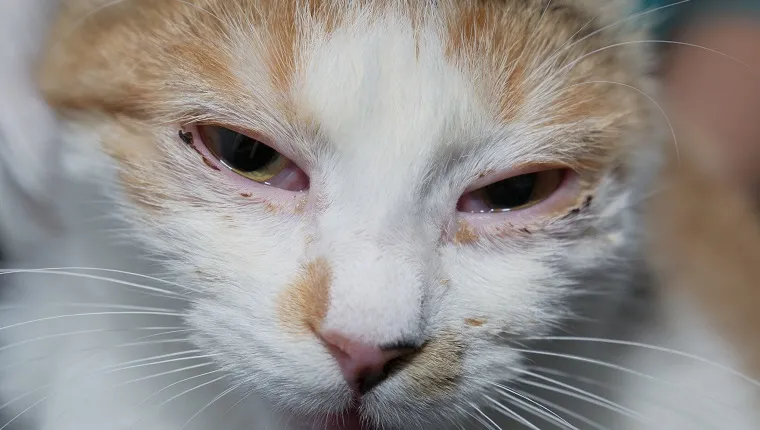Feline herpesvirus (FHV) in cats is a virus that can lead to the upper respiratory infection known as feline viral rhinotracheitis (FVR), plus general eye problems. This virus is very contagious among cats, and it causes one of the most common infections in cats.
Some cats can carry the virus without showing symptoms at all, even though they can still spread it to other cats. Even cats who recover carry the virus for life, and it may reactivate when a cat is under stress or going through corticosteroid treatment.
If you see symptoms in your cat, then you must get to a veterinarian for a proper diagnosis and treatment. Here’s what you should know about the symptoms, causes, and treatments for feline herpesvirus in cats.
Symptoms Of Feline Herpesvirus In Cats
Feline herpesvirus in cats often makes it seem like your cat might be suffering from a flu or a cold.
Some of the most common symptoms include:
- Watery discharge from the eyes
- Sneezing a lot
- Congestion
- Pink eye, or conjunctivitis
- A loss of appetite
Causes Of Feline Herpesvirus In Cats

Feline herpesvirus in cats is usually passed around through contact with some of the discharge that might be present in an infected feline’s eyes or nose.
Some of the main ways that this can happen include:
- Sharing a litter box
- Grooming each other
- Sharing food and water bowls
Causes such as these mean that the virus often passes around quickly among cats in shelters or colonies where they’re around other kitties all the time.
The virus may go latent, then reactivate in cats who’ve already recovered when they undergo physical or psychological stress, as well.
If you were wondering, humans cannot catch FHV from cats!
Treatments For Feline Herpesvirus In Cats
If you your vet suspects that your cat is suffering from feline herpesvirus, they’ll carry out a physical examination, paying close attention to the eyes and nose. In the most severe cases, they may order an X-ray.
Your vet may recommend a course of medication — either antiviral pills or antibiotics — if they deem it helpful in lessening the effects of the infection. They’ll also give you advice on cleaning your cat’s eyes and nose if there’s a significant amount of discharge.
While recovering at home, it can be beneficial to make sure that the living environment is as stress-free and comfortable as possible. Adding a humidifier can often help with any congestion issues.
Anecdotal evidence also suggests that the supplement lysine can be beneficial in some cases of feline herpesvirus.
Have you ever looked after a cat with a case of feline herpesvirus? What advice did your vet give you for treatment? Let us know in the comments section below!









